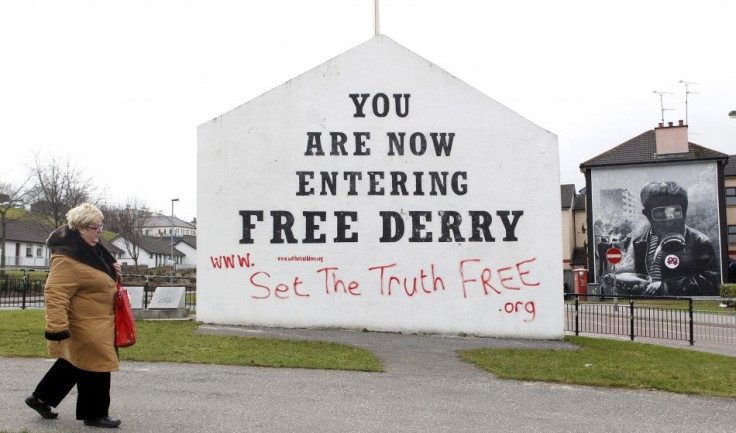‘Give Ireland Back to the Irish’: The Coolest, Bravest Thing Paul McCartney Ever Did (VIDEO)

I noted the serendipity of Paul McCartney’s 71st birthday (on Tuesday) occurring at the same time as the G-8 summit of global leaders in County Fermanagh, Northern Ireland.
More than forty years ago, McCartney was moved by a tragedy in his ancestral homeland to do something completely unexpected and uncharacteristic -- the scrupulously image-conscious and apolitical former Beatle recorded an explicitly political song that condemned the British government.
The atrocity that spurred McCartney to express his anger was, of course, the infamous ‘Bloody Sunday’ episode of January 30, 1972, in which British soldiers shot 26 unarmed civil rights protesters in the Bogside area of Derry in Ulster, killing fourteen people, including seven teenagers.
In response, McCartney -- who up to this point had eschewed overtly political sloganeering and activism and criticized former bandmate John Lennon’s high-profile political posturing -- was so repulsed by the cold-blooded killings of his fellow Irishmen that less than a month later he released a song entitled “Give Ireland Back To The Irish.”
The song -- which directly criticized the British military presence in Ulster – was, in fact, the first single issued by McCartney’s new band, Wings. In early 1972, when no one could have predicted the subsequent massive global success of Wings, McCartney’s musical career was at an all-time low.
Still widely blamed for the break-up of the Beatles just two years prior, McCartney was almost universally lambasted by music critics for the poor quality and insipid nature of his post-Beatles output. He may have felt he had nothing to lose at this point.
"From our point of view, it was the first time people questioned what we were doing in Ireland,” McCartney told author Mark Lewisohn. “[Bloody Sunday] was so shocking.”
Not surprisingly, the song was banned by BBC, which meant that it could not be played on the radio or on television broadcasts. McCartney's record company, the august EMI led by Sir Joseph Lockwood, reluctantly released the 45.
But with no airplay whatsoever and largely negative reviews by critics, the song still somehow managed to reach the British singles charts (going as high as the 16th highest spot), while climbing to the tops of the charts in both the Republic of Ireland and Spain. (Five year later, the Sex Pistols first album would also rise to the top in defiance of its banned status).
For McCartney, the single about the Irish Troubles marked an unusual juncture.
After years of Lennon and Yoko Ono’s public demonstrations over various issues (including peace), and less than six months after George Harrison’s triumphant “Concert for Bangladesh,” McCartney’s wading into such controversial waters was rather jarring.
Clearly, as an Irishman and a humanitarian, McCartney's conscience was pricked enough to compose his first real protest song.
Interestingly, the two “Irish” songs that Lennon (a fellow Irishman) would release that same year – “Sunday Bloody Sunday” and “Luck of the Irish” – largely went unnoticed or dismissed as the public had long grown tired of John and Yoko’s antics.
However, in retrospect, ‘Give Ireland Back to the Irish’ was hardly as strident as once thought – in no way did McCartney express any support for the Irish Republican Army, nor did he call for retaliation against the British army in Ulster. In stark contrast, Lennon openly allied himself with the IRA and even bizarrely accused British soldiers of committing “genocide” in Northern Ireland.
In a bizarre and humorous post-script, McCartney exhibited a seldom seen wicked sense of humor with his next single -- the intentionally harmless and tame “Mary Had a Little Lamb,” an obvious jab at BBC for their refusal to play ‘Give Ireland Back to the Irish’.
In the four decades since, McCartney has ascended to a level of fame, popularity and acclaim that might be unprecedented – clearly one of the greatest songwriters in history, he is also one of the most influential pop culture forces the world has ever seen. He has largely shied away from political stances, aside from his embrace of such passions as vegetarianism and animal rights.
‘Give Ireland Back to the Irish’ represented a strange, anomalous period of McCartney's epic career – but this little song should not be forgotten.
© Copyright IBTimes 2024. All rights reserved.











